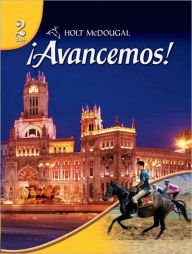
All Solutions
Page 467: Actividad 3
– **saber *(to know)*** becomes **sabr-** $Rightarrow$ Yo sabr**é**, Tú sabr**ás**, etc.
– **poder *(can)*** becomes **podr-** $Rightarrow$ Yo podr**é**, Tú podr**ás**, etc.
On other hand, some infinitives change a letter. For example:
– **salir *(to go out)*** becomes **saldr-** $Rightarrow$ Yo saldr**é**, Tú saldr**ás**, etc.
– **venir *(to come)*** becomes **vendr-** $Rightarrow$ Yo vendr**é**, Tú vendr**ás**, etc.
En el año 2050, los doctores **sabrán** curar más enfermedades.
*By the year 2050, doctors **will know** how to cure more diseases.*
– **saber *(to know)*** becomes **sabr-** $Rightarrow$ Yo sabr**é**, Tú sabr**ás**, etc.
– **poder *(can)*** becomes **podr-** $Rightarrow$ Yo podr**é**, Tú podr**ás**, etc.
On other hand, some infinitives change a letter. For example:
– **salir *(to go out)*** becomes **saldr-** $Rightarrow$ Yo saldr**é**, Tú saldr**ás**, etc.
– **venir *(to come)*** becomes **vendr-** $Rightarrow$ Yo vendr**é**, Tú vendr**ás**, etc.
En el año 2050, **habrá** más smog.
*In the year 2050, **there will be** more smog.*
– **saber *(to know)*** becomes **sabr-** $Rightarrow$ Yo sabr**é**, Tú sabr**ás**, etc.
– **poder *(can)*** becomes **podr-** $Rightarrow$ Yo podr**é**, Tú podr**ás**, etc.
On other hand, some infinitives change a letter. For example:
– **salir *(to go out)*** becomes **saldr-** $Rightarrow$ Yo saldr**é**, Tú saldr**ás**, etc.
– **venir *(to come)*** becomes **vendr-** $Rightarrow$ Yo vendr**é**, Tú vendr**ás**, etc.
En el año 2050, **tendrás** robots para limpiar la casa.
*In the year 2050, **you will have** robots to clean the house.*
– **saber *(to know)*** becomes **sabr-** $Rightarrow$ Yo sabr**é**, Tú sabr**ás**, etc.
– **poder *(can)*** becomes **podr-** $Rightarrow$ Yo podr**é**, Tú podr**ás**, etc.
On other hand, some infinitives change a letter. For example:
– **salir *(to go out)*** becomes **saldr-** $Rightarrow$ Yo saldr**é**, Tú saldr**ás**, etc.
– **venir *(to come)*** becomes **vendr-** $Rightarrow$ Yo vendr**é**, Tú vendr**ás**, etc.
En el año 2050, más estudiantes **saldrán** de la escuela hablando español.
*By the year 2050, more students **will graduate** from school speaking Spanish.*
– **saber *(to know)*** becomes **sabr-** $Rightarrow$ Yo sabr**é**, Tú sabr**ás**, etc.
– **poder *(can)*** becomes **podr-** $Rightarrow$ Yo podr**é**, Tú podr**ás**, etc.
On other hand, some infinitives change a letter. For example:
– **salir *(to go out)*** becomes **saldr-** $Rightarrow$ Yo saldr**é**, Tú saldr**ás**, etc.
– **venir *(to come)*** becomes **vendr-** $Rightarrow$ Yo vendr**é**, Tú vendr**ás**, etc.
And some verbs don’t follow any pattern. For example:
– **decir *(to to say)*** becomes **dir-** $Rightarrow$ Yo dir**é**, Tú dir**ás**, etc.
– **hacer *(to do)*** becomes **har-** $Rightarrow$ Yo har**é**, Tú har**ás**, etc.
En el año 2050, los políticos apenas **dirán** la verdad.
*In the year 2050, politicians **will hardly tell** the truth.*
– **saber *(to know)*** becomes **sabr-** $Rightarrow$ Yo sabr**é**, Tú sabr**ás**, etc.
– **poder *(can)*** becomes **podr-** $Rightarrow$ Yo podr**é**, Tú podr**ás**, etc.
On other hand, some infinitives change a letter. For example:
– **salir *(to go out)*** becomes **saldr-** $Rightarrow$ Yo saldr**é**, Tú saldr**ás**, etc.
– **venir *(to come)*** becomes **vendr-** $Rightarrow$ Yo vendr**é**, Tú vendr**ás**, etc.
And some verbs don’t follow any pattern. For example:
– **decir *(to to say)*** becomes **dir-** $Rightarrow$ Yo dir**é**, Tú dir**ás**, etc.
– **hacer *(to do)*** becomes **har-** $Rightarrow$ Yo har**é**, Tú har**ás**, etc.
En el año 2050, yo **querré** vivir aquí.
*In the year 2050, I **will want** to live here.*
– **saber *(to know)*** becomes **sabr-** $Rightarrow$ Yo sabr**é**, Tú sabr**ás**, etc.
– **poder *(can)*** becomes **podr-** $Rightarrow$ Yo podr**é**, Tú podr**ás**, etc.
On other hand, some infinitives change a letter. For example:
– **salir *(to go out)*** becomes **saldr-** $Rightarrow$ Yo saldr**é**, Tú saldr**ás**, etc.
– **venir *(to come)*** becomes **vendr-** $Rightarrow$ Yo vendr**é**, Tú vendr**ás**, etc.
And some verbs don’t follow any pattern. For example:
– **decir *(to to say)*** becomes **dir-** $Rightarrow$ Yo dir**é**, Tú dir**ás**, etc.
– **hacer *(to do)*** becomes **har-** $Rightarrow$ Yo har**é**, Tú har**ás**, etc.
En el año 2050, nosotros **podremos** mejorar mucho el medio ambiente.
*In the year 2050, we **will be able** to greatly improve the environment.*
– **saber *(to know)*** becomes **sabr-** $Rightarrow$ Yo sabr**é**, Tú sabr**ás**, etc.
– **poder *(can)*** becomes **podr-** $Rightarrow$ Yo podr**é**, Tú podr**ás**, etc.
On other hand, some infinitives change a letter. For example:
– **salir *(to go out)*** becomes **saldr-** $Rightarrow$ Yo saldr**é**, Tú saldr**ás**, etc.
– **venir *(to come)*** becomes **vendr-** $Rightarrow$ Yo vendr**é**, Tú vendr**ás**, etc.
And some verbs don’t follow any pattern. For example:
– **decir *(to to say)*** becomes **dir-** $Rightarrow$ Yo dir**é**, Tú dir**ás**, etc.
– **hacer *(to do)*** becomes **har-** $Rightarrow$ Yo har**é**, Tú har**ás**, etc.
En el año 2050, la gente **pondrá** computadoras en muchos cuartos de sus casas.
*In the year 2050, people **will put** computers in many rooms of their homes.*

